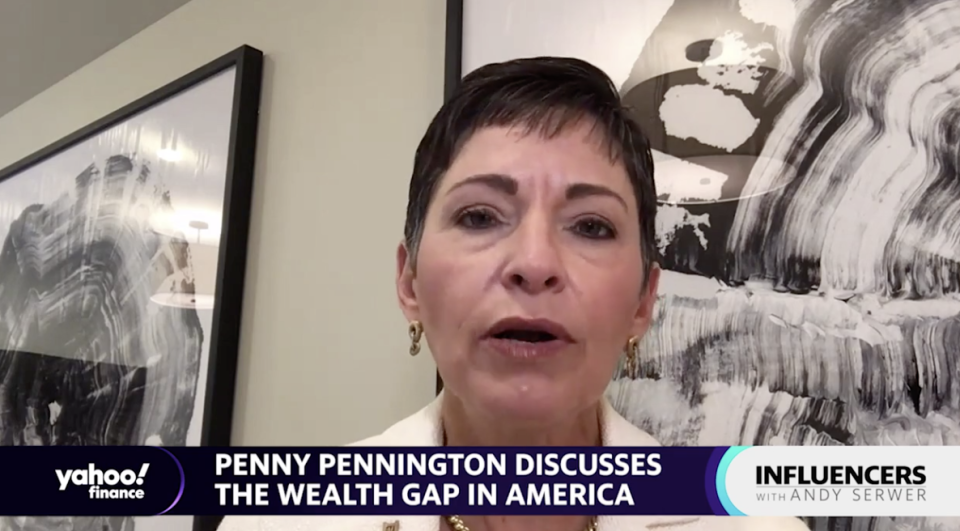Business leaders need to help solve wealth inequality: Edward Jones exec
Billionaires in the U.S. have added over half a trillion dollars in wealth amid the coronavirus outbreak while tens of millions of workers have lost their jobs, exacerbating inequality that had already reached heightened levels before the pandemic.
In a recent interview, Edward Jones Managing Partner Penny Pennington called on business leaders to help solve income inequality, saying the struggles of low-income Americans threaten the consumer base and workforce on which companies rely.
“Leadership and business leadership needs to be thinking about the wealth gap in our economy,” says Pennington, who leads the financial advisory firm Edward Jones, which serves seven million clients in the U.S. and Canada with a combined $1.3 trillion in assets.
“As business leaders, by virtue of the business that we do,” she adds. “By virtue of the fact that we attract and seek to develop great talent, that we are dependent on the health of consumers to purchase our products and want to be part of our firms — that wealth inequality and that wealth gap is concerning to all of us.”
The call to address wealth inequality has gained urgency among economic titans over the past year, drawing concern from the likes of former Fed Chair Janet Yellen and JPMorgan Chase CEO Jamie Dimon. Last August, a call to address income disparity was issued by an association of CEOs at major companies called the Business Roundtable, which Dimon led as chairman from 2017 to 2019.
But economic inequality has deepened since the spread of the coronavirus in the U.S. became widely known in March, as business shutdowns devastated the real economy but only temporarily set back the stock market from which wealthy Americans disproportionately benefit.
Business leaders should help address the embedded economic conditions that keep many Americans in difficult financial circumstances, Pennington said.
“Some of those [circumstances] are because of structural issues that have become part of our society and part of our economy,” Pennington says. “We as business leaders — I'll put myself in in in that corner — we need to be thinking about and and actively working for solutions to those structural biases and inequalities.”
Pennington spoke to Yahoo Finance Editor-in-Chief Andy Serwer in an episode of “Influencers with Andy Serwer,” a weekly interview series with leaders in business, politics, and entertainment.

Pennington said Edward Jones strives to make its financial advice available to low-income customers but acknowledged that some would not make use of the services due to their economic conditions.
“There is a wide range of point of view and an opportunity for folks to marshal their own resources, to look to their own personal responsibility to grow their financial literacy and really to open up options in the future,” she says. “We can help advise and coach them with all of that.”
“We also have to recognize, as leaders, that there are folks by virtue of their circumstances [who] simply don't have access to those options,” she adds.
Read more:
Stock market factoring in ‘smooth ride’ to economic recovery: Edward Jones exec
Coronavirus vaccine 'possible' by winter: Top Harvard scientist
Bill Gates: We should be able to ‘manufacture a lot of vaccines’ next year
Michael Dell: ‘Not enough’ progress on diversity in the tech industry
Read the latest financial and business news from Yahoo Finance

 Yahoo Finance
Yahoo Finance